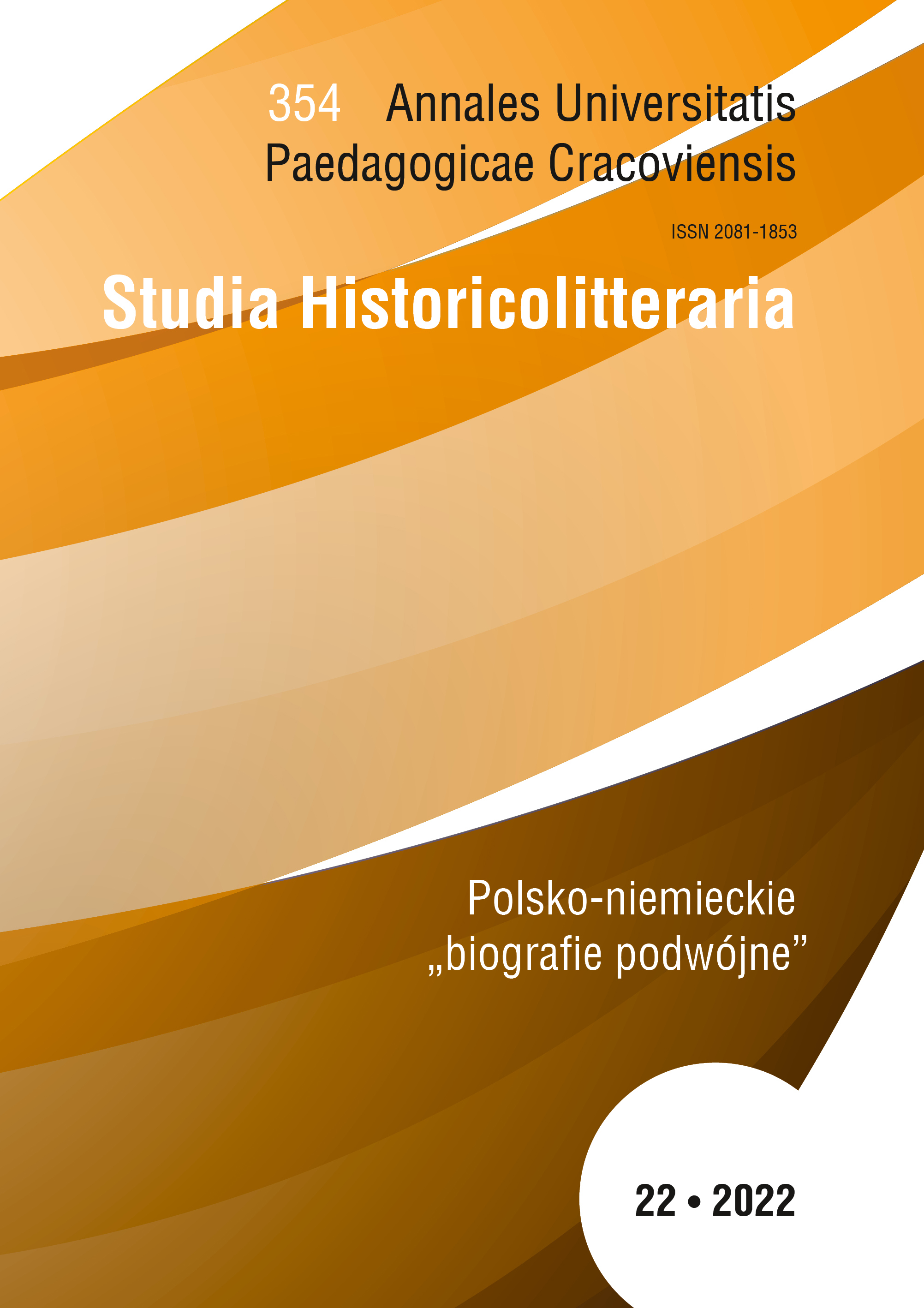Freeing oneself from the primacy of memory or taming strangeness. Identity transformations in Peter (Piotr) Lachmann’s "Gliwice Hamlet. Rehearsal or Touch through the Pane"
Main Article Content
Abstract
This paper is an analysis of Hamlet gliwicki [eng. Gliwice Hamlet] (Messel 2008) by the Polish-German writer Peter Lachmann (b. 1935). The article presents the genesis of the drama inspired by the fate of a Wehrmacht soldier lost during the Battle of Stalingrad in January 1942. This is the writer’s father Ewald Lachmann. In addition to the parodic means used in the play, the intertextual links between Gliwice Hamlet and William Shakespeare’s Hamlet are discussed, as well as the topoi of Shakespearean tragedy interwoven with episodes from Lachmann’s biography and events from the history of Gliwice. The figure of Hamlet takes on the role of a mask and functions as a universal archetype behind which the play’s creator himself hides. The bilingualism of Peter - the play’s protagonist - and the overlapping of two identities, Polish and German, are examined in terms of a palimpsest. The analysis shows that Lachmann’s drama is characterised by the lack of a linear course of events and their anchoring in a fluid, liminal space-time. The protagonist’s identity transformations are accompanied by the transformation of his immediate environment, as the German city of Gleiwitz turns into the Polish city of Gliwice.
Downloads
Article Details

This work is licensed under a Creative Commons Attribution-NonCommercial-NoDerivatives 4.0 International License.
COPYRIGHT POLICY
The publisher of "Annales Universitatis Paedagogicae Cracoviensis.Studia Historicolitteraria" is authorised to use and distribute all the materials published in the journal on the basis of a non-exclusive licence agreement unlimited in time – previously concluded for an indefinite period of time each time with the author of a specific paper in the fields of exploitation specified in the agreement.
OPEN ACCESS POLICY
"Annales Universitatis Paedagogicae Cracoviensis.Studia Historicolitteraria” is an open access journal, and all its contents are available for free to users and/or their institutions on the basis of non-exclusive licenses under Creative Commons (CC BY CC-BY-4.0). Users can read, download, make copies, distribute, print, search, or to link to full text articles in this journal without the prior permission of the publisher or the author.This is consistent with the definition of open access BOAI (http://www.soros.org/openaccess).
References
Borodziej W., Hajnicz A., Raport końcowy, [w:] Kompleks wypędzenia, red. W. Borodziej, A. Hajnicz, Kraków 1998, s. 373-429.
Brzostowska-Tereszkiewicz T., Wielojęzyczność jako chwyt, „Teksty Drugie” 2009, nr 6, s. 48-65.
Caillois R., Mimicry and Legendary Psychasthenia, „October” 1 December 1984, vol. 31, przeł. J. Shepley, s. 17-32.
Chojnowski P., Zur Identität eines zweisprachigen Autors, [w:] Kulturelle Identitäten im Wandel - Grenzgängertum als literarisches Phänomen, red. M. Czarnecka, Ch. Ebert, Berlin 2006, s. 171-181.
Csáky M., Das Gedächtnis der Städte. Kulturelle Verflechtungen - Wien und die urbanen Milieus in Zentraleuropa, Wien 2010, s. 203-208.
Czapski J., Unmenschliche Erde, przeł. W. Gromek [pseudonim P. Lachmanna], wstęp M. Sperber, Köln-Berlin 1967.
Dąbrowski M., Komparatystyka dyskursu / Dyskurs komparatystyki, Warszawa 2009, s. 251-252.
Fischer J., „Żyję w dwóch światach, myślę w dwóch językach”. Posłowie dramatu, [w:] Peter (Piotr) Lachmann, Hamlet gliwicki. Próba albo
dotyk przez szybę, Messel 2008.
Genette G., Palimsesty. Literatura drugiego stopnia, przeł. T. Stróżyński, A. Milecki, Gdańsk 2014.
Kacprzak P., Polityka władz polskich wobec ludności niemieckiej w okresie funkcjonowania Ministerstwa Ziem Odzyskanych „Czasopismo Prawno-Historyczne” 2010, t. LXII, z. 2, s. 215-235.
Kowalski P., O jednorożcu, Wieczerniku i innych motywach mniej lub bardziej ważnych. Szkice z historii kultury, Kraków 2007, s. 47-49.
Lachmann P., Jak (nie) zostałem wypędzony, „Dialog. Magazyn Polsko-Niemiecki” 2004, nr 68, s. 55-59.
Lachmann P., Motywy i motywacje, „Śląsk” 2005, nr 3, s. 22-23.
Lachmann R., Gedächtnis und Literatur, Frankfurt am Main 1990.
Lachmann R., Płaszczyzny pojęcia intertekstualności, „Pamiętnik Literacki” 1991, nr 4, s. 209-215.
Mancewicz A., “Remember thee?”: Post-War Memory and Guilt in Peter Piotr Lachmann‘s Performance Hamlet from Gliwice,
“Shakespeare Seminar”, Ausgabe 7, Post(Modernist) Responses to Shakespeare, Deutsche Skakespeare-Gesellschaft 2009, s. 11-20.
Nora P., Epoka upamiętniania, [w:] Rewanż pamięci, red. J. Żakowski, wstęp L. Kieres, Warszawa 2002, s. 59-68.
Plett H.F., Sprachliche Konstituenten einer intertextuellen Poetik, [w:] Intertextualität. Formen, Funktionen, anglistische Fallstudien, red. U. Broich, M. Pfister, Tübingen 1985, s. 78-97.
Ricoeur P., Pamięć, historia, zapomnienie, przeł. J. Morgański, Kraków 2006.
Sosnowska M., “Reflecting upon “Hamlet of Gliwice. The Rehearsal or the Touch Through the Screen”, „Multicultural Shakespeare:
Translation, Appropriation and Performance” 2010, vol. 6/7, s. 125-134.
Spitzer L., „Wielojęzyczność” jako środek stylistyczny i wyraz wyobraźni fonetycznej, [w:] Studia stylistyczne, red. M.R. Mayenowa, R. Handke, przeł. R. Handke, Warszawa 1972, s. 236-267.
Woldan A., Der Österreich-Mythos in der polnischen Literatur, Wien 1998.
Wolff-Powęska A., Pamięć - brzemię i uwolnienie. Niemcy wobec nazistowskiej przeszłości (1945-2010), Poznań 2011.
Zalewska A., Palimpsest, [w:] Modi memorandi. Leksykon kultury pamięci, red. M. Saryusz-Wolska, R. Traba, J. Kalicka, Warszawa 2014, s. 318-322.
